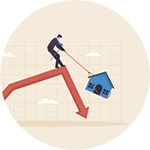A flat end to a disappointing 2023
- Property sales fell by 41% year on year for England and Wales, making July a record low for the month.
- House prices remained close to record highs at £304,387 in England and Wales until September.
- Bank of England base rate holds at 5.25% and is not set to change until mid-2024
- Property Mark reports, "Prospective buyer numbers continue to fall".
- Remortgage volume lowest level for October
- Autumn's budget fails to offer real incentives for first-time buyers or second-home movers.
- Millions of people are borrowing to pay essential bills this Christmas, charities have warned, with energy debts a key concern and increases in council tax.
- With increasing rents of 10%, lending for house purchases will fall by eight per cent, with higher living costs and general uncertainty in the housing market; I expect 2024 to be flat until the summer.
- Read our local housing market reports for - London, Kent, Hampshire, West Midlands and West Yorkshire.
After a year of high inflation and 14 consecutive base rate increases, the Housing Market leaves 2023 flat and deflated, although some property commentators are seeing the seeds of growth for 2023.
According to the Royal Institution of Chartered Surveyors, UK surveyors are more optimistic about future house sales than they have been for almost two years. November 2023 marked the first rise in sales expectations since early 2022 as mortgage rates dropped following consecutive months of no change to base rates. The measure of forecasted sales in the next three months rose to six in November, up from minus 17 in October.
UK Finance sees a dimmer picture, with lending for house purchases predicted to fall by eight per cent in 2024. They expected lending for house purchases to fall from £130 billion in 2023 to £120 billion next year due to higher interest rates and household costs, making it harder for people to afford a mortgage. Remortgages are expected to fall eight per cent to £60 billion, and buy-to-let purchase lending will fall 13 per cent to £7 billion.
Rightmove predicts average house prices to fall by one per cent next year as competition increases among sellers. This will impact the landlords being pushed out of the housing market as record rents drive first-time buyers to do whatever they can to get on the property ladder – just as high mortgage rates weaken investors’ buying power. Fewer landlords will see rents continue to rise. Hamptons revealed that rents on new tenancies have risen by a record 10.2 per cent across Britain.
Zoopla predicts that rents across the UK will increase by five per cent by December 2024. This would be the smallest increase in roughly three years.
With rising living costs for rent, mortgage interest, energy and council tax, the likelihood of 2024 getting off to a flying start is nil.

Will the base rate fall in 2024?
Huw Pill, the chief economist of the Bank of England, stated Interest rates are unlikely to return to the near-zero levels seen in the 2010s. Rates are instead likely to settle at a level “below where we are” but probably higher than the pre-Covid era.
He suggested that the Bank might wait until the middle of 2024 before cutting interest rates from their current 15-year high.
What did the Autumn statement bring?
Not a lot!
The housing market hoped for something to inject life into it; however, we were left with more planning application reforms. Any hope of abolishing stamp duty or applying a higher band didn't appear in the budget. Developers are offered more accessible pathways to get planning, but will this equate to more properties being built, or do they still hold back to keep prices high?
New housing developments are at a record low.
The Home Builders Federation stated the number of planning permissions granted for new homes has fallen to a record low in the 12 months to the end of September. The data shows just 2,447 projects were approved in the third quarter of this year, down three per cent from the previous three months and down 19 per cent compared to the same period in 2022.
The government's changes to planning should address this issue if developers choose to use it.
Will 2024 be better than 2023?
In a typical year, January sees excitement in the housing market, with a flood of properties coming to market and completing in time for the Easter break. This may still happen, especially if the cost of living crisis forces the hands of those homeowners stuck in a property; they can't afford to remortgage or pay the bills.
The Joseph Rowntree Foundation reported that a third of those it surveyed still had loans to pay off, which had initially been taken out to cover the costs of food, housing, energy bills or council tax. This is echoed by the debt management charity StepChange, which estimates that 2.6 million adults (5% of England and Wales) used credit to pay for essential household bills in the last three months. This will only worsen as nearly a million households face council tax rises of up to 15 per cent after two more local authorities announced they were at risk of bankruptcy. If this is added to the potential cost of paying extra on energy bills to cover customers’ bad debts under industry regulator plans, those in rented housing and homeowners will face substantial financial challenges in the first half of 2024.
With increasing rents of 10%, lending for house purchases will fall by eight per cent, with higher living costs and general uncertainty in the housing market; I expect 2024 to be flat until the summer.
Lowest sales volume for July
London 
London has the second lowest sales volume for July since records began; the lowest was during Covid when the Government placed the housing market on freeze. Whilst volume increased month-on-month by 3% to 4,734, this is 42% down on last year's 8,194.
England & Wales
England and Wales echo London with a 41% fall year on year, making July the worst on record. With average house prices for September being only £2k off the record high set in November 2022 of £306,051, the start of 2024 will be slow and sluggish.
Average house prices are not falling, but sales are going under the asking price; what is happening?
Asking prices are higher than average house prices. The selling agent suggests the asking price and agrees with the seller. The asking price is usually linked to previously sold properties in the area, with an additional X% added for growth and negotiation room.
This means that even though sales are being agreed to under the asking price, it isn't under the current average price for the property. As such, the average sale price remains close to record highs with only minor single-digit percentage falls. There won't be a huge fall in house prices until asking prices are set closer to current selling prices. Savills have echoed this as they stated that the housing market is past its “peak pain”, with prices expected to fall three per cent in 2024 before beginning to rise.
Propertymark state: Prospective buyer numbers continue to fall
In October's most recent Housing Insight Report, Propertymark states, "Despite some optimism creeping into the economy, market conditions remain challenging within the sector. Last month, there was a slight reduction in the average number of new prospective buyers registered per branch. The trend continues this month, down to 53 in October 2023, from 60 in September and 81 in August....a re-emergence of seasonal trends, with a corresponding downturn seen in 2022 in the run-up to the festive period".
If Propertymark is correct, we will see an uplift for potential buyers and sales agreed in January and February. However, my instinct tells me this is more than just a seasonal downturn because, in 2022, we faced the Liz Truss budget fiasco, which was a substantial contributing factor to the downturn from October. The summer of 2021 was incredibly volatile, and while sales fell in October to 51,565, they rose in November (64,464) and December (69,906).
Remortgages
UK Finance forecasts mortgage arrears could rise from 105,600 cases by the end of this year to 128,000 in 2024; however, it does not expect repossessions to increase equally. Whilst these are just those who fall into mortgage arrears, millions face affordability issues, which will flow through into the number of people able to afford to remortgage.
The Bank of England confirms the above positions as they reported remortgage approvals fell to 23,673 in October, a fall of 53% on last year's 50,680. Homeowners aren't just sitting tight; they are staying quiet as they battle getting through a financially brutal winter.


Andrew Boast FMAAT
CEO of SAM Conveyancing
2023 has seen record low sales volumes in England and Wales for every month this year because of several factors that caused the base rate to go up for 14 consecutive months to a 15-year high. However, this didn't stop house prices from remaining close to record highs in London and England/Wales.
The forecasts for falling mortgage approvals, increases in the cost of living crisis, declining wage growth and a base rate set to remain the same until mid-next year mean 2024 will be flat. Whilst Propertymark feel this is a seasonal drop, I see the lack of buyers as an affordability issue rather than a seasonal low, and we will see in January, the prospective buyers and offers agreed to be lower than 2022 and under the asking price.
What will improve the housing market in 2024 will be more mortgage products of under 4.7% for a 2 to 5-year fixed deal, fresh housing stock at affordable prices and inflation to fall to 4-3%, allowing confidence to grow with a lower base rate. The base rate won't return to 0.1%, but 3-4% will open the door for the new generation of first-time buyers to get on the housing ladder.
Sources: Latest data from - Gov.UK, Bank of England, UK House Price Index, ONS and Property Mark (NAEA).

Without Killing Anyone
This book could be the difference between every mover’s dream, buying and moving into your new home stress free, or, stress, missed deadlines, legal disasters, building defects, and possibly the collapse of the whole transaction. (Costing you a small fortune, a head full of grey hairs, and, driving you to threaten the life of your solicitor, lender, co-owners, family, partner, or some combination of all five).
With more than two decades’ experience in the conveyancing sector and over 50,000 successful client moves under his belt, Andrew shares insider tips and advice to empower you as a buyer, giving you the tools to make the best decisions for your circumstances and ease the chaos.
Available on Amazon | Kindle | Paperback












